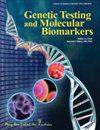人类白细胞抗原-G基因3-非翻译区单倍型与红斑狼疮的关联研究
IF 1
4区 生物学
Q4 GENETICS & HEREDITY
引用次数: 0
摘要
背景:人类白细胞抗原-G(HLA-G)是一种参与免疫调节和耐受的关键蛋白,而系统性红斑狼疮(SLE)是一种受遗传和环境因素影响的多方面自身免疫疾病。研究表明,HLA-G 的变异和突变可能会影响系统性红斑狼疮的发展。研究目的本研究旨在探讨 HLA-G 基因 3'- 非翻译区 (UTR) 的多态性与系统性红斑狼疮之间的关系。方法:对 100 名系统性红斑狼疮患者和 100 名系统性红斑狼疮患者的 DNA 进行分析:使用聚合酶链反应扩增目标序列,分析来自 100 名系统性红斑狼疮患者和 100 名对照组的 DNA。测定等位基因和基因型频率,使用 Haploview v.4.2 软件评估单倍型并计算联系不平衡。结果研究结果显示,+2960 Ins等位基因与系统性红斑狼疮的风险因素有显著关联,而Del等位基因具有保护作用。此外,+3010C等位基因和+3187A等位基因在等位基因和基因型水平上都与系统性红斑狼疮显著相关。在基因型水平上,+3142 GG 等位基因与系统性红斑狼疮明显相关。单倍型分析发现,UTR-2单倍型是系统性红斑狼疮的风险因素,而UTR-1单倍型则具有保护作用,从而揭示了影响系统性红斑狼疮风险的遗传因素。结论这项研究强调了HLA-G基因3'-UTR多态性在系统性红斑狼疮易感性中的重要性,表明它们有可能成为诊断或治疗的靶点。本文章由计算机程序翻译,如有差异,请以英文原文为准。
Association Study of 3-untranslated region Haplotype of Human leukocyte antigen-G Gene with Lupus.
Background: Human leukocyte antigen-G (HLA-G) is a pivotal protein involved in immune regulation and tolerance, while systemic lupus erythematosus (SLE) is a multifaceted autoimmune condition influenced by genetic and environmental factors. Research indicates that variations and mutations in HLA-G may impact SLE development. Objective: This study aimed to explore the relationship between polymorphisms in the 3'-untranslated region (UTR) of the HLA-G gene and SLE. Methods: DNA from 100 SLE patients and 100 controls was analyzed using polymerase chain reaction to amplify the target sequence. Allele and genotype frequencies were determined, and haplotypes were assessed using Haploview v.4.2 software, with linkage disequilibrium calculated. Results: Findings revealed that the +2960 Ins allele was significantly linked to SLE as a risk factor, with the Del allele showing a protective effect. In addition, the +3010C allele and +3187A allele were significantly associated with SLE at both allele and genotype levels. The +3142 GG homozygote was notably linked to SLE at the genotype level. Haplotype analysis identified UTR-2 haplotypes as risk factors for SLE, whereas the UTR-1 haplotype was protective, shedding light on genetic factors influencing SLE risk. Conclusion: This study underscores the importance of HLA-G gene 3'-UTR polymorphisms in SLE susceptibility, suggesting their potential as diagnostic or therapeutic targets.
求助全文
通过发布文献求助,成功后即可免费获取论文全文。
去求助
来源期刊
CiteScore
2.50
自引率
7.10%
发文量
63
审稿时长
1 months
期刊介绍:
Genetic Testing and Molecular Biomarkers is the leading peer-reviewed journal covering all aspects of human genetic testing including molecular biomarkers. The Journal provides a forum for the development of new technology; the application of testing to decision making in an increasingly varied set of clinical situations; ethical, legal, social, and economic aspects of genetic testing; and issues concerning effective genetic counseling. This is the definitive resource for researchers, clinicians, and scientists who develop, perform, and interpret genetic tests and their results.
Genetic Testing and Molecular Biomarkers coverage includes:
-Diagnosis across the life span-
Risk assessment-
Carrier detection in individuals, couples, and populations-
Novel methods and new instrumentation for genetic testing-
Results of molecular, biochemical, and cytogenetic testing-
Genetic counseling

 求助内容:
求助内容: 应助结果提醒方式:
应助结果提醒方式:


